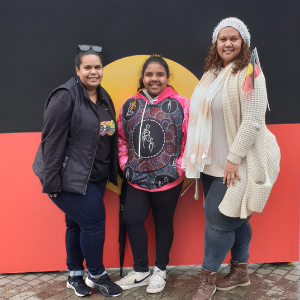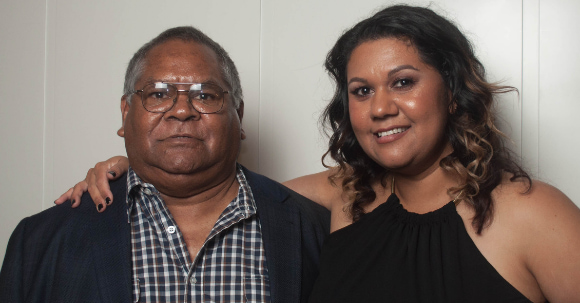Amy Wilson is passionate about communicating through storytelling. With over ten years at OZ Minerals she’s progressed from an entry-level administration role to Site Communications Lead at Prominent Hill and was a part of introducing whole-site work flexibility in a mining company – almost unheard of!
The value of storytelling
In her decade with OZ Minerals, Amy has worked across various departments and roles. She’s spent time in mining and geology, underground, operations, events coordination and more. On secondment to an engineering team, she realized the teams weren’t communicating as well as they could be. Amy wanted people to think more about how their communications would be interpreted, and how you bring words to life in the real world.
She advocated having a dedicated on-site communications team for the first time, with a focus on storytelling.
“I’m Aboriginal, and storytelling is the way we connect.”
Using storytelling to drive communication was a new idea at Prominent Hill. Amy shared,
“It can be hard for people to grasp. It’s about challenging each other and asking different questions to get a different outcome. It’s not just about saying, this is how we’re going to run this project, but we ask why, and how you get different people onsite to understand things.”
They’re still in the early stages of developing the plan and putting together the framework. It will include steps such as what a brief looks like, how you include stories and how to get a wide range of people to walk away from any communication with enhanced understanding.
“I’m passionate about getting people who don’t know how to communicate to become good communicators, and making people really good storytellers. The framework is simple. It’s down to a couple of questions, thinking about your audience and then thinking about what path you will follow. I want people to think about the person receiving the communications and how they are going to interpret it. Storytelling presents the pros and cons in a simple way.”

Leading with flexibility
As a highly operational industry, it can be difficult to introduce wide-spread flexible working options, but Amy is up for the challenge! She was part of a project in an engineering maintenance team to investigate how flexibility can be enabled across the team.
“OZ Minerals pinpointed engineering maintenance because it’s a challenging team. They have to maintain the plant to run it, it’s all on time schedules, and they physically have to be onsite. The question was how we could introduce flexible work for them?”
Amy started by running leadership workshops to understand what flexibility meant to them.
“It was really interesting that flexibility often meant family stuff, none of it resonated with work for them. All they saw was at home or at work; there was no overlap. So that was our starting point, and history of mining that was never built for flexibility, it was always a commander telling you when and where to work. We encouraged people to talk about flex.”
Amy helped set up an employee on the engineering team up for a 0.5 roster, so he worked 8 days on followed by 20 days off.
“We did little pockets of pilots, to see how people would adapt, how crews would get along, and how to change the FIFO culture. It worked in plenty of cases! There was an employee on maternity leave, and we had to work out how she could come back to the mine site without being expected to spend eight days at a time away from her small baby. We set her up on a three-five roster.”

The pandemic accelerated the mindset shift around flexibility, and Amy shared a fabulous story to demonstrate it – of course!
Every 18 weeks, the processing plant is shut for maintenance. The Shutdown Coordinator is generally onsite coordinating the workplan. OZ Minerals trialed her working from home, where she successfully managed the coordination of over 300 people – rosters, time sheets, breathalyzing, buses, scheduling – everything, all from home. Previously the team was heavily reliant on the Shutdown Coordinator being onsite, but the trial was such a success it’s now a permanent shift to working from home.
“The pandemic forced people offsite and then accelerated flex working. As restrictions lift, we’ve gone back and employees have adjusted the requirements of when they need to be onsite , and why.”
Supporting families onsite
OZ Minerals understands that the FIFO nature of mine working can be tough on families who are separated. That’s one of the drivers for increasing flexible work options – allowing families to spend more time together.
Amy also plays a role in keeping families connected.
“I had an open conversation with an older man talking about retiring. We know in mining we’re going to start losing the older generation who might be wanting to spend more time on their grandchildren or on things outside of work like volunteering . We’re looking at ways to bridge the knowledge gap by retaining access to retirees for shorter work assignments.”
Prominent Hill is a 24/7 mine, which means it never shuts down. Amy reintroduced bringing families of those rostered to work during Christmas to site. She worked to coordinate bringing over 120 family members to a working mine site overnight, arriving on Christmas morning and staying until Boxing Day. People who were rostered on could see their families overnight, and the families were taken on a mine tour.

The Work-Life plans are a new tool OZ Minerals is using to support their employees.
“It’s a tailored plan based on their whole of life needs and role requirements that looks at where, how and when you work. I was surprised when they introduced it, because how many employers ask you about the goals you have for your personal life? It was great to put it down on paper and think about what I really want to achieve. Personally, I want to do better and look after my health, and I want to see my family more. I can fulfil both sides of my life, it becomes a blend not a balance.”
Amy loves the people and the culture at OZ Minerals and is convinced that there will be at least many more years of opportunities for her there.
“OZ Minerals are doing many things that don’t just add value to the company but will actually change peoples’ lives. You don’t usually see a mining company invested in you entirely, but here you’re not just a number. We’re part of something that’s bigger than just pulling ore out of the ground.”
“I’m also passionate about education. I’m now back at uni because I made wrong choices when I was younger. I’m passionate about the younger generation around me finishing school, going on to further study. Never stop learning. I think education can open so many pathways that you don’t understand when you’re 16. You think you know everything, but finish your schooling!”



